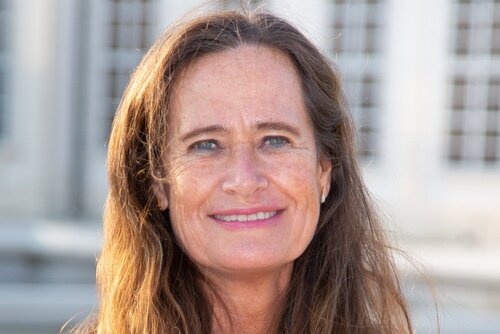![]()
6 May 2025
Interview with Monique Danser, outgoing EFP treasurer
Categories:Communication, Institutional

As Monique Danser concludes her six-year tenure as EFP treasurer, she reflects on a period of significant transformation and growth for the federation. In this interview, she shares insights into the financial priorities that shaped her two terms, from securing the EFP’s sustainability and deepening partnerships to streamlining processes and supporting strategic development. With a steady hand and a collaborative spirit, she has helped guide the EFP through both challenges and milestones, leaving it stronger, more professional, and better positioned for the future.
Question: Over your two terms as EFP treasurer, what were the key financial priorities you focused on, and how have these evolved?
Monique Danser: One of our first priorities was sustainability (including financial), both in terms of our congresses and the way the EFP operates. We also successfully changed our banking arrangements, concentrating on Belgium, where the EFP is officially based.
Another key area was strengthening our relationships with partners. We increased contact, especially online, and I introduced an in-person meeting during the October executive committee meeting to allow for more informal, meaningful discussions.
We also made it a priority to provide members with financial figures well in advance of the General Assembly. That has been consistently achieved.
Our partners are essential to achieving the EFP mission: to advance all aspects of periodontology and dental implantology, and to promote the importance of gum health to dental and medical professionals, students, patients, and the public. They play a crucial role in realising our strategic vision. We created a newsletter for our partners, giving them a platform to share their initiatives and highlight their sustainability efforts.
Q: What do you consider your main achievements in ensuring the EFP’s financial health and sustainability?
MD: We increased the number of partners from seven to nine and built a stronger relationship with them. Together we were able to realise many projects, white papers, student symposia and workshops, which is amazing. The Covid years were tough, but we managed well by reducing in-person meetings and being more conscious of spending. We introduced policies encouraging early travel booking to save costs on flights and hotels.
The EFP funding remained strong, and we significantly streamlined the accounting process: everything is now digital, making it easier and more transparent.
Q: What insights or lessons have you gained about planning and governance in a not-for-profit professional organisation like the EFP?
MD: One key lesson is the importance of continuity: having one stable partner close to the treasurer on the EFP board (Nicola West, the secretary general) to discuss issues and share experiences, made a big difference.
Each president brings a different style and focus, which means the federation keeps evolving. The team (the treasurer and the secretary general, as well as the EFP staff: Mónica, Sharon and Cândice) must adapt to the (renewable) three-year terms. As we’ve grown, our level of professionalism has grown too.
We’ve developed many policies to increase transparency and amended the bylaws. Maintaining close contact with members is vital and recognising the diversity of our membership across many countries is key. I signed many contracts, learned about employment laws in Belgium and Spain and discussed several topics with the EFP lawyer and our accountants.
The EFP Students Symposium is a highly valuable event that plays a crucial role in shaping the future leaders in our field. The postgraduate programmes featured are of exceptional quality. For the 2026 edition, we’ve secured a partner to fund the event, marking a significant milestone for the EFP. This partnership not only enhances the sponsor’s visibility but also introduces a new business model for us moving forward.
Q: This role required dedication and many hours behind the scenes. What kept you motivated, and what did you personally gain from the experience?
MD: It’s been incredibly rewarding to see how committed all EFP board and committee members are in their roles, and to reflect on everything we’ve achieved together over these six years: the guidelines, the Economist Impact papers and the awareness campaigns. Collaborations with partners like Cochrane, the Oral Health Platform, and professional societies in cardiology, general medicine, and paediatric dentistry have also been crucial. These efforts aim to improve oral health for all, and I believe we’ve made real progress.
The EFP has grown in membership, including more international associate members, and our congresses are very well attended.
On a personal note, I’ve really enjoyed working with Nicola and the EFP staff, Sharon, Cândice and Mónica. Together with Mónica and Simone Binnema, I worked closely on a day-to-day basis to manage all EFP financial matters. It’s been a pleasure to grow together in this journey. I was part of the EuroPerio9 committee before becoming the treasurer, and I’ve seen the EFP become more professional and at the forefront of knowledge. It has been a pleasure and a privilege.
The first two years, during Covid, were especially challenging - with no travel - but it gave us more time for internal development. It was also the time that Cândice joined us as EFP head of communications: we realised that with the growth of the EFP we needed better communication. That was a good decision! I’ve enjoyed conversations about the EFP with people like Ubele Van der Velden, one of the EFP’s founders, who always speaks about the federation in such a passionate way. It was also great to connect with Iain Chapple who invited me to become treasurer. I’ve never regretted saying yes!
Q: What did you enjoy most about working with the executive committee and contributing to the broader vision of the EFP?
MD: As I mentioned, it’s been fantastic to see the growing recognition of the importance of periodontal and oral health, both among professionals and the public. We’re also now closer to policymakers, and we have taken our cause to EU institutions in Brussels! Being part of the Oral Health Platform is a real achievement.
Q: Looking ahead, what do you see as the key financial opportunities or challenges the EFP may face in the next few years?
MD: Keeping up with all our partners and the many projects we run with them will continue to be a big task. It’s a lot of work, and that workload is increasing.
Having a communication officer is essential. Communicating what the EFP does clearly and effectively to our members, stakeholders, health professionals, and the public is key to strengthening our community.
And of course, our congresses - especially EuroPerio - are vital for the EFP’s financial sustainability.
Q: On a more personal note, how will you look back on this chapter of your professional journey, and is there a particular moment or memory that stands out?
MD: I look back on it with pleasure and pride. Over these six years, especially working closely with the EFP secretary general, we’ve steered the EFP towards becoming a more professional, influential federation with greater international recognition.
There are many memorable moments, but one that stands out is EuroPerio10. It was a real milestone: being able to hold the congress after Covid, at the start of the war in Ukraine, and finally coming together in Copenhagen. We visited all our partners in the industry forum, and everyone was so positive. It was a fantastic event: great congress, great location, great vibe!
And I must mention the fact that, for the first time, there were two women on the board; that also felt really special.
It’s been an honour to serve as the EFP treasurer. I worked hard, learned a lot, and I leave the EFP in a very solid financial position. I’m truly grateful for the trust the EFP members placed in me and wish my successor all the best!




